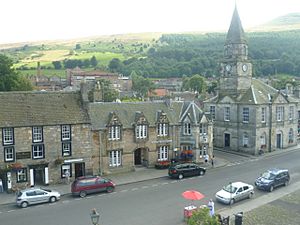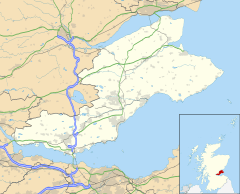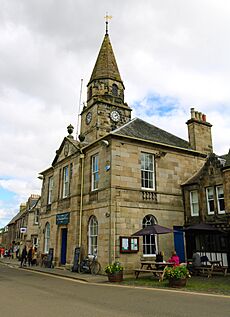Falkland, Fife facts for kids
Quick facts for kids Falkland
|
|
|---|---|
 Falkland from the Palace |
|
| Population | 1,041 (2022) |
| OS grid reference | NO253077 |
| Council area | |
| Lieutenancy area | |
| Country | Scotland |
| Sovereign state | United Kingdom |
| Post town | CUPAR |
| Postcode district | KY15 |
| Dialling code | 01337 |
| Police | Fife |
| Fire | Fife |
| Ambulance | Scottish |
| EU Parliament | Scotland |
| UK Parliament |
|
| Scottish Parliament | |
Falkland (Scottish Gaelic: Fàclann) is a charming village in Fife, Scotland. It sits at the foot of the Lomond Hills. Once known as the Lands of Kilgour around the year 1200, Falkland later became a royal burgh and a historical capital. In 2022, about 1,041 people lived here.
Contents
What's in a Name?
The name Falkland has been around for a long time. Early versions include Falleland (around 1128) and Falecklen (around 1160). The second part of the name, lann, likely means "enclosure" in Scottish Gaelic. The first part could come from Gaelic words meaning "hidden," "wash," or "heavy rain."
Some people later thought the name meant "falcon land" or "folkland." However, these ideas are probably not correct. In the Middle Ages, only the castle was called Falkland. The village and area were known as Kilgour. This name might mean "church or cell of Gabrán."
A Look Back in Time
The area around Falkland, known as Kilgour, existed before the 12th century. The building of Falkland Castle after 1160 was very important. It helped the medieval village grow, bringing in workers and craftspeople. When King Malcolm gave the royal hunting land of Falkland to Duncan, Earl of Fife in 1160, a castle was likely built. Today, the site of the old Falkland Castle is inside the grounds of the current Falkland Palace.
The original church of Kilgour was west of the modern town. A new church was built in Falkland town about 30 years later. This was done by master mason John Mylne and his son. The site of the old Kilgour church is now part of a farm.
Falkland was made a royal burgh in 1458. This meant it had special rights from the king. However, Falkland grew mostly because of its castle and palace. So, it didn't work like other royal burghs.
Falkland was the birthplace of Richard Cameron. He was a famous 17th-century Covenanter. Covenanters were a Scottish religious and political movement. Richard was a schoolmaster in the town before becoming a traveling preacher. His house can still be seen on the main street. Another Covenanter, Robert Gillespie, was arrested for preaching here. He was sent to prison on the Bass Rock.
In the late 1800s, John, Marquis of Bute, inherited much of this land. He hired architects John Kinross and Robert Weir Schultz. They helped restore many parts of the village, including the Palace.
Falkland's Influence
- The Falkland Islands in the South Atlantic are named after Anthony Cary, 5th Viscount Falkland.
- The famous American country singer Johnny Cash had family roots in this part of Fife. Many Scottish and Irish immigrants settled in the British colonies before the American Revolutionary War.
- Today, Falkland's parish church is a special stop on the St Margaret Pilgrim Journey.
Famous Buildings

Falkland is known as Scotland's first conservation village. This means its historic buildings are protected. The most famous building is Falkland Palace. King James IV started building it in 1500. It is a great example of French-style Renaissance architecture in Scotland. The palace was built for the royal court when they came to Falkland to hunt. Mary, Queen of Scots, visited often. The palace also has a Roman Catholic church.
Like at Holyrood Palace in Edinburgh, a fire happened here in 1654. This was during the time Oliver Cromwell's soldiers were staying there. The fire destroyed the East Range of the palace. The royal court never returned after 1665. The village and palace were not looked after until the 1800s. Then, a lot of rebuilding and restoration work began. Today, the palace and its gardens are open to visitors. They are looked after by the National Trust for Scotland.
Falkland has many Listed buildings. These are buildings with special historical or architectural importance. Five of them are in the highest category (Category A):
- Falkland Palace (including its royal stables and tennis court)
- The House of Falkland
- Falkland Town Hall
- Moncrief House
- Brunton House
Village Life and Culture
The village has an old horse market. It is also home to the Falkland Cricket Club and the Falkland Golf Club. For several years, a big environmental festival called The Big Tent was held here. It took place in the grounds of Falkland Estate. Famous musicians like the Proclaimers and Rosanne Cash performed there. Since 2016, the main event has been the Craft Symposium. This event celebrates traditional crafts through talks, workshops, and demonstrations.
The Falkland Library and Falkland Community Hall are run by the Falkland Community Development Trust. This group helps provide facilities for many community activities. All residents of Falkland can become members of the trust.
The Falkland Society holds regular meetings with speakers. They have also published several books about the village's history.
Sports in Falkland
Falkland has one of the oldest real tennis courts in the world. It was built for James V of Scotland in 1539. Real tennis is an older version of the game we know today. This court is the oldest one still in use, and it's the only active one without a roof. The Falkland Palace Royal Tennis Club organizes games here.
The Falkland Cricket Club started in 1860. This makes it the oldest cricket club in Fife. The club has played at Scroggie Park since 1948.
There are also local running groups like Falkland Trail Runners, Get Fit Falkland, and the Lomond Hill Runners. The Falkland Trail Runners organize the Falkland Hill trail race. This race happens during the village's annual gala.
Famous People from Falkland
- Rev George Buist (1779-1860) was a minister in Falkland from 1802 to 1813. He later became the Moderator of the General Assembly of the Church of Scotland in 1848.
- Sir David Deas, a Royal Navy officer, was born and grew up in Falkland.
See also
 In Spanish: Falkland para niños
In Spanish: Falkland para niños
 | Jessica Watkins |
 | Robert Henry Lawrence Jr. |
 | Mae Jemison |
 | Sian Proctor |
 | Guion Bluford |



